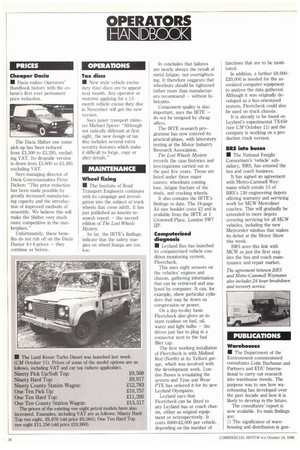MAINTENANCE
Page 38

If you've noticed an error in this article please click here to report it so we can fix it.
Wheel fixing • The Institute of Road Transport Engineers continues with its campaign and investigation into the subject of truck wheels that come adrift. It has just published an interim research report — the second edition of The Lost Wheels Mystery.
So far, the IRTE's findings indicate that the safety margins on wheel fixings are too low. In concludes that failures are nearly always the result of metal fatigue, not overtightening. It therefore suggests that wheelnuts should be tightened rather more than manufacturers recommend — without lubricants.
Component quality is also important, says the IRTE — do not be tempted by cheap offers.
The IRTE research programme has now entered its practical phase, with laboratory testing at the Motor Industry Research Association.
The Lost Wheels Mystery records the case histories and investigations carried out in the past five years. These are listed under three major causes; wheelnuts coming lose, fatigue fracture of the studs, and cracking wheels.
It also contains the IRTE's findings to date. The 24-page A4 size booldet costs £2 and is available from the IRTE at 1 Cromwell Place. London SW7 Computerised diagnosis • Leyland Bus has launched its computerised vehicle condition monitoring system, Fleetcheck.
This uses eight sensors on the vehicles' engines and chassis, gathering information that can be retrieved and analysed by computer. It can, for example, show particular cylinders that may be down on compression or power.
On a day-to-day basis Fleetcheck also gives an instant readout on fuel, oil, water and light bulbs — the driver just has to plug in a connector next to the fuel filler cap.
The first working installation of Fleetcheck is with Midland Red (North) at its Telford garage, which was involved with the development work. London Buses is evaulating the system and Tyne and Wear PTE has ordered it for its new Leyland Olympians.
Leyland says that Fleetcheck can be fitted to any Leyland bus or coach chassis, either as original equipment or retrospectively. It costs R60042,000 per vehicle, depending on the number of functions that are to be monitored.
In addition, a further P.13,000E20,000 is needed for the associated computer equipment to analyse the data gathered. Although it was originally developed as a bus-orientated system, Fleetcheck could also be used on truck chassis.
It is already to be found on Leyland's experimental TX450 (see CM October 11) and the company is working on a production truck version.
BRS into buses • The National Freight Consortium's 'vehicle' subsidiary, BRS, has entered the bus and coach business.
It has signed an agreement with Metro-Cammell Weyinarui which entails 15 of BRS's 130 engineering depots offering warranty and servicing work for MCW Metroliner coaches. This will gradually be extended to more depots covering servicing for all MCW vehicles, including the new Metrorider minibus that makes its debut at the Motor Show this week.
BRS sees this link with MCW as just the first step into the bus and coach maintenance and repair market.
The agreement between BRS and Metro-Cammell Weymann also includes 24 hour breakdown and recovery service.
































































































































































































